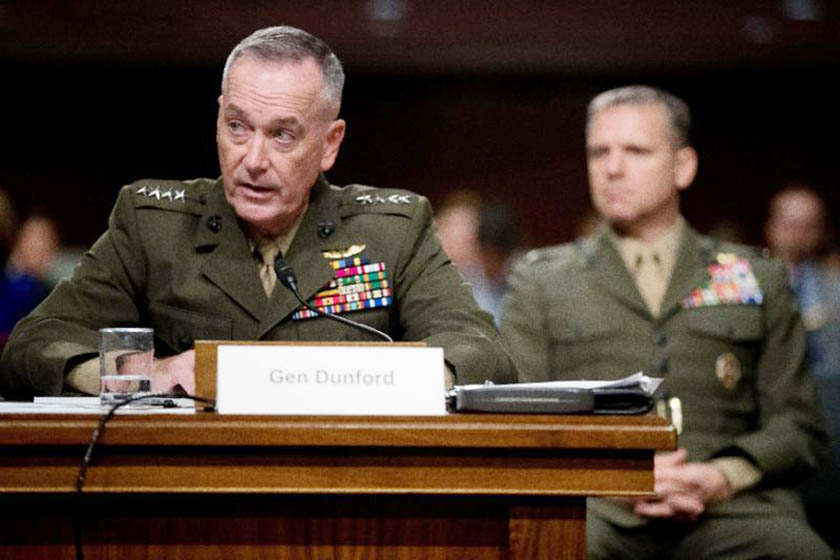
AP, Washington :
The top U.S. general said Thursday that an Islamic State rocket that hit a military base used by hundreds of U.S. troops in northern Iraq contained chemical agents that cause human skin to blister.
Marine Gen. Joseph Dunford, chairman of the Joint Chiefs of Staff, was asked at a Senate Armed Services Committee hearing Thursday about the disclosure a day earlier that the Islamic State may have attacked Qayara West air base with chemical weapons.
U.S. officials had said Wednesday that an oily substance found on a fragment of the rocket that landed inside the security perimeter of the base initially tested positive for mustard agent, but that a second test was negative. They said further laboratory testing was scheduled.
“We assess it to be a sulfur-mustard blister agent,” Dunford said, adding that no one was injured by it.
He called the incident a “concerning development.”
Dunford made no mention of the U.S. presence on the Qayara West base, but an official on Wednesday said “hundreds” of U.S. troops are there helping the Iraq security forces prepare for a coming offensive in Mosul.
Dunford said that while the Islamic State has a “chemical warfare network,” it has only limited means of making effective chemical weapons. He noted that last week the U.S. military attacked a former pharmaceutical plant near Mosul in northern Iraq that U.S. officials said the Islamic State was using to produce mustard agent and other chemicals for military use.
Another report adds: In the three days since the Iraqi city of Fallujah was reopened for residents following its recapture from the Islamic State group, just over 500 families have returned home, Maj. Gen. Saad al-Harbea, the head of west Baghdad operations, said.
Hundreds more have massed around the checkpoints that block the city’s entrance to await the multiple security approvals required to re-enter Fallujah, which lies 40 miles (65 kilometers) west of the Iraqi capital. But the vast majority of the 300,000 people that made up the city’s prewar population remain scattered across the country.
Fallujah was the first Iraqi city to fall to IS, in January 2014. Its civilian population steadily declined after the militant takeover, with some families renting homes in the Iraqi capital, Baghdad, or traveling further north to the country’s semi-autonomous Kurdish region.
Many more civilians were forced out of the city by Iraqi troops as they pushed through Fallujah, leaving a ghost town in their wake. Fallujah was declared “fully liberated” in June, following an operation that officially lasted just over a month and was assisted by U.S.-led airstrikes. The tens of thousands of people who left the city last summer often ended up in desert camps with little food or water.
Al-Harbea defended the security checks outside Fallujah as essential to preventing IS from regaining power in the city. “Of course we need to turn some people away,” he said.
He said Iraqi intelligence agencies had drawn up lists of IS collaborators based on information from local leaders and informants within the extremist group. Ten families had been turned away so far because “they had sons or fathers with connections to Daesh,” he said, using the Arabic acronym for the Islamic State group.

